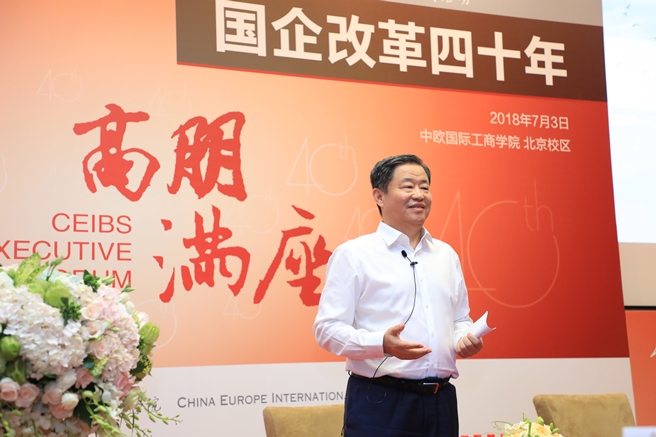
On July 3, Mr. Frank Ning, Chairman of Sinochem Group, was invited to the “40-year Reform of State-owned Enterprises” Forum. This was a theme forum hosted by the CEIBS (China Europe International Business School) under the theme of “Tribute to the 40th Anniversary of Reform and Opening-up Activities.”. Chairman Frank Ning delivered a speech at the forum on the history, management and reform of state-owned enterprises in China.
Mr. Li Mingjun, President of CEIBS, extended a welcome address at the event. Professor Xu Dingbo, Associate Dean of CEIBS, attended the theme dialogue.
In the keynote speech, Chairman Frank Ning explained the positive role of state-owned enterprises in China’s economic and social development in the past few decades with vivid examples. For the first time he proposed a five-principle model for understanding enterprises: First, the attributes and functions of enterprises; second, the power system; third, the evaluation system; fourth, resource allocation, and finally, employment of people.
According to Chairman Frank Ning, state-owned enterprises are closely linked to the progress of the country and the nation. They stabilize the lifeline of the country’s economy, drive employment of tens of millions of people, provide social services, upgrade the industrial level, and create economic and social values. Over the past 40 years, state-owned enterprises in China have experienced multi-domain and multi-level reforms such as in production efficiency, governance structure, capital market and so on. The autonomy of enterprises has been greatly enhanced, coupled with the modern enterprise system and capital market being gradually established.
Subsequently, Chairman Frank Ning explained in detail the five links relating to the understanding of enterprises. He believes that enterprises are the most important, human and vital social organization in modern society. Improving efficiency, reducing costs, and innovation are the essential attributes of enterprises. “A country is a country of enterprises, and a city is a city of enterprises.” Recognition of the important position and role of enterprises is a mature representation of a mature commercial civilization. Different understanding of the attributes of enterprises will lead to continuous changes in the power system. Factors such as wealth, spirit, reputation, professionalism and technology can drive enterprises to go in different directions. Only a sound evaluation system and clear evaluation standards can scientifically evaluate business management and personnel at the organization. Only then effective allocation of resources can be made possible. The most important thing is the choice of people, because people are the most active, scalable and cost-effective element in all industries. What kinds of managers are recruited is the most powerful and instantaneous signal. Difference in the use, evaluation, motivation and cultivation of people will result in different effect of resource allocation. Speaking on employment of people, it also has to return to the cognition of corporate attributes and goals. The five links are interlocked in this way.
During the dialogue and interaction session, Chairman Frank Ning and Mr. Xu Dingbo exchanged ideas with more than 140 EMBA alumni and students of CEIBS on examination and evaluation, integration of industry and finance, and mixed ownership reform.
After sharing a number of cases of strategic integration of enterprises through resource integration, Chairman Frank Ning emphasized that the emergence of Internet technology has fundamentally changed the management technology of enterprises, . links Links such as communication, management, data exchange have been reduced, and corporate culture is displaying a greater significance. At the same time, technology has broken the boundaries of enterprises and changed the ecological mode of enterprises. A diversified development of large enterprises will become a trend. In addition, when it comes to the reform of state-owned enterprise, Chairman Frank Ning stated that mixed ownership reform is a major form of state-owned enterprises to achieve fundamental reforms, but the issues of management rights, incentives and exit mechanisms need to be explored and practiced. Entrepreneurs should be left with more space to make their decisions, mobilize their initiative to propose solutions.